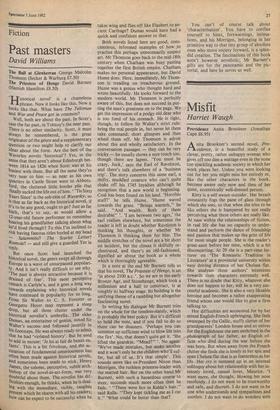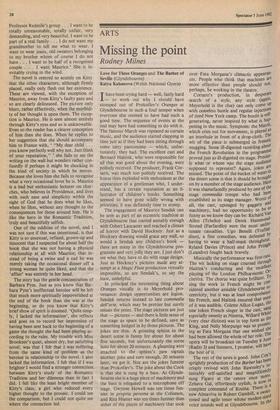Misfit
Harriet Waugh
Providence Anita Brookner (Jonathan Cape £6.95)
Anita Brookner's second novel, Pro- vidence, is a beautiful study of a clever, pretty, rather unhappy woman who gives off too dim a wattage even in the none too sparkling academic society in which her work places her. Unless you were looking out for her you might miss her entirely or, like the other characters in the book, become aware only now and then of her quiet, eccentrically well-dressed person.
Kitty is a self aware outsider. Her breath constantly fogs the pane of glass through which she sees, so that when she tries to be like others she is hampered by not really perceiving what these others are really like. At ease within the relationships of fiction, in real life she has no capacity to under- stand and perform the dance of friendship and passion that makes up the grist of life for most single people. She is the reader's great-aunt before her time, which is a bit disconcerting. At 29 she is a part-time lec- turer on 'The Romantic Tradition in Literature' at a provincial university within easy driving distance of her Chelsea flat. She analyses these authors' intentions towards their characters extremely well. There is no doubt that Kitty, whatever else does not happen to her, will be a very suc- cessful academic. She is also a very likeable heroine and becomes a rather exasperating friend whom one would like to give a firm talking to.
Her difficulties are accounted for by her mixed English-French upbringing. She feels swamped by the Gallic, stuffy clutter of her grandparents' London house and so strives for the Englishness she sees enshrined in the photograph of her father, an English of- ficer who died during the war before she was born. But when away from the French clutter she finds she is lonely in her spit and span Chelsea flat that is as featureless as her life. Her cry is summed up in an internal soliloquy about her relationship with her in- tensely loved, casual lover, Maurice. 'I want more, she thought, blowing her nose resolutely. I do not want to be trustworthy and safe, and discreet. I do not want to be one who understands and sympathises and soothes. I do not want to do wonders with Professor Redmile's group . . . I want to be totally unreasonable, totally unfair, very demanding, and very beautiful. I want to be part of a real family . . . I do not want my grandmother to tell me what to wear. I want to wear jeans, old sweaters belonging to my brother whom of course I do not have . . . I want to be half of a recognised couple . . . I want Maurice.' She is in- evitably crying in the wind.
The novel is centred so acutely on Kitty that the other characters, although firmly placed, really only flesh out her existence. These are viewed, with the exception of Maurice, away from Kitty's faulty gaze and so are clearly delineated. The picture only blurs, rather effectively, when the morbidi- ty of her thought is upon them. The excep- tion is Maurice. He is seen almost entirely through Kitty's eyes and so is unknowable. Even so the reader has a clearer conception of him than she does. When he replies to her suggestion that she should accompany him to France with, "My dear child . you know perfectly well why not. Just think of your reputation," ' she fails to see the writing on the wall but wonders rather con- fusedly if perhaps it might be shocking in the kind of society in which he moves. Because she loves him she fails to recognise what a very occasional lover he is. Maurice is a bad but enthusiastic lecturer on chur- ches, who believes in Providence, and lives with such ease and simplicity within the sight of God that he does what he likes, when he likes, without any thought to the consequences for those around him. He is like the hero in the Romantic Tradition, truly and beautifully selfish.
One of the oddities of the novel, and I was not sure if this was intentional, is that Kitty is so unsexual, refined, grown-up and innocent that I suspected for about half the book that she was not having a physical relationship at all with Maurice; that in- stead of being a swine and a cad he was merely taking the occasional dinner off a young woman he quite liked, and that the 'affair' was entirely in her head.
The story has the gentle concentration of Barbara Pym. Just as you know that Bar- bara Pym's ineffectual heroine will be left that much more spiritually impoverished at the end of the book than she was at the beginning, so do you know that Kitty's brief show of spirit is doomed. 'Quite simp- ly, I lacked the information', she reflects and goes on to record her impression of having been sent back to the beginning of a game she thought she had been playing ac- cording to the rules. My trouble with Miss Brookner's quiet, almost dry, but satisfying novel, was that I felt that I was suffering from the same kind of problem as the heroine in relationship to the novel. I also lacked the information. I felt that if I was brighter I would find a stronger connection. between Kitty's study of the Romantic Tradition and her dilemma than in fact I did. I felt like the least bright member of Kitty's class, a girl who reduced every higher thought to the prosaic. I could see the comparison, but I could not quite see where the connection led.







































 Previous page
Previous page